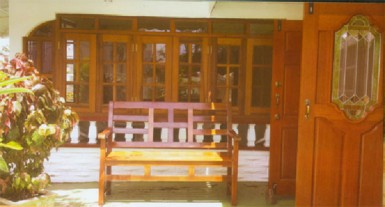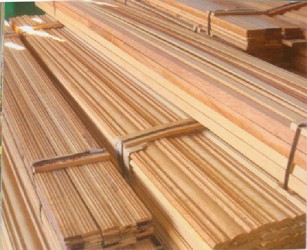A sharper focus on value-added production and discussions with stakeholders on the formulation of a new log export policy are amongst the priorities for the forestry sector identified in the five-year (2015-2020) – strategic plan promulgated by the Forest Products Development and Marketing Council of Guyana (FPDMC).
This state-run entity was created to work with stakeholders to promote the sustainability of the country’s forest products by increasing value-added and competitiveness through improved capability and enhanced trade opportunities and market access.
In an interview earlier this week, FPDMC Executive Chairman Rajnarine Singh told Stabroek Business that the conclusion of ongoing European Union/ FLEGT negotiations is expected to lead to the signing of a Voluntary Partnership Agreement with the EU designed to ensure that only legally harvested timber is imported into EU countries by countries agreeing to take part in the scheme.

With the finalization of the VPA now imminent Singh said that the FPDMC is preparing to sensitize stakeholders to the opportunities which the agreement with the EU will now create for the sector. He explained that what the new agreement meant was the both logs and value-added products would become admissible to the EU market without undue scrutiny.
According to Singh, greater access to the EU market would place the local timber industry under pressure to produce higher quality timber and timber products. Singh said that since European standards are generally well-regarded in other importing countries the agreement with the EU will serve as a kind of credential that is more than likely to be accepted in North America. Singh said that the FPDMC was hoping that the opportunities which the FLEGT agreement would afford would encourage sector stakeholders to raise the quality of their product. He explained that the agreement with the EU would bind importers into that market to adhere to conditions governing harvesting methodology, legality of source and traceability. “We have already started to compile information as part of the process of educating stakeholders,” Singh said.
And against the backdrop of publicly expressed concerns regarding the alleged proliferation of log exports from Guyana, Singh told Stabroek Business that 70 per cent of logs harvested locally go towards the value-added sector. He said that while he was aware of comments being made about the quality of locally manufactured value-added products and the increase in imported wooden products into Guyana, he believed the competition afforded by imported products had impacted positively. “I think our local producers are recognizing that unless they raise their standards they will lose out the imports,” Singh said.
Singh said, meanwhile, that the FPDMC was seeking to respond to the problem of poor quality timber on the local market by accelerating the promotion of both conventional and solar-powered kiln driers. He said that there were ample opportunities for access to kiln-drying facilities, since apart from the three community kilns being operated at Anna Regina, Linden and Crabwood Creek – all of which he said were underused – there was additional capacity available in the private sector.

And according to him, the ‘culture’ among some operators of failing to pursue an effective timber-drying process can be remedied through changes to the existing building code.
Last year’s overall timber production of 527,000 cubic metres exceeded the previous year’s harvested timber figure of 437,000 cubic metres whilst the value of timber and timber products rose from US$39 million in 2013 to US$54 million last year. Singh said that export figures for January this year – US$3.530 million – exceeded those for the corresponding period last year – US$2.026 million.





